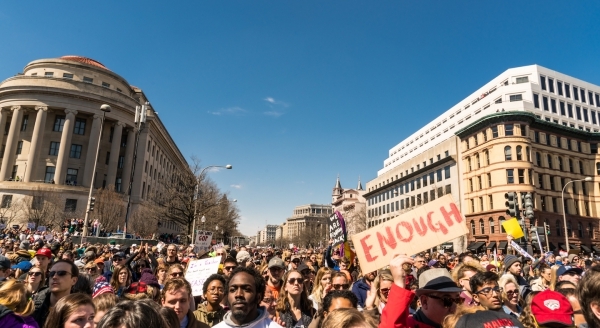SAXTONS RIVER — They are gay, straight, and transgender. They are Jewish, Christian, and Muslim. They are black, white and Latino. They are middle-class, affluent, and poor.
They are the teens of Parkland, Florida, the kids in Washington, D.C. and Chicago schools, the 11-year old children who spoke so eloquently to the crowds in Washington at the March for Our Lives on March 24.
And together they are doing something we've never seen before.
They are connecting the dots - recognizing something we now call “intersectionality,” defined by Merriam-Webster as “the complex, cumulative way in which the effects of multiple forms of discrimination (such as racism, sexism, and classism) combine, overlap, or intersect especially in the experiences of marginalized individuals or groups.”
Their words were heard around the country and the world by multitudes of people who flowed into the streets of their hometowns to plead in unison: “Enough is enough.”
* * *
Together, the voices of millions formed a chorus speaking truth to power as they awakened to the connections being made in the name of universal human rights.
These children are leading - and not just away from gun violence in schools, movie theaters, malls, clubs, or the police who shoot innocent black people and get away with it.
These future leaders were speaking about the much-larger issues that America has failed to address - issues like poverty, class, race, gender, disability, and institutionalized discrimination.
They were pleading for the survival of all of us, and for a future defined by unity and not division, love and not hate, compassion and not greed, and dignity and not death, whether by commission or omission.
They were demanding that we place values above violence, and they did so with such respect, force, energy, and eloquence that there was hardly a dry eye in the crowd.
They taught us a life lesson, and they gave us a reason to hope.
They know that what happens in their homes, their community, their houses of worship, and their schools could happen in any of ours, no matter what color we are, how much wealth we have, or how mainstream we may have become.
* * *
The root of the youth movement these days, so tragically launched by the events of Feb. 14, 2018 in a school in Florida, is what empowers students of Marjory Stoneman Douglas High School and the others now joining them. Its foundation is what they understand about the “realpolitik.”
These “kids” are defining and now representing a new generation that is not only unique but vital, because they truly get it: that together we stand, divided we fall.
Additionally, they know how to bring their vision and their message to voters, to so-called leaders, and to those whose political futures are at stake.
Strategically, these emerging adults are nothing short of brilliant. They understand how to use social media, and they have a natural proclivity for using the methods of media advocacy, which means they put a human face on their issue, they tell stories to humanize statistics, they include action steps in their message - register, educate, vote! - and they repeat tag-lines that are pithy, powerful, and easily repeated.
* * *
The woman for whom the now-well-known school was named, Marjory Stoneman Douglas, would be so proud of these students. A journalist and author, women's suffrage advocate, and conservation activist, she was every bit as feisty and politically astute as the students who attend the school that bears her name.
Douglas's influential book The Everglades: River of Grass, published in 1947, redefined the popular conception that the Everglades were nothing more than a worthless swamp. It has been compared to Rachel Carson's important book Silent Spring.
According to her Wikipedia profile, Douglas was “outspoken and politically conscious of the women's suffrage and civil rights movements.” She undertook her work to protect the Everglades when she was nearly 80 years old and she lived nearly 30 years beyond that, working to the end.
Marjory Stoneman Douglas's spirit and legacy are now being felt not only by students who went to school one day as youngsters and came out (if they were lucky) as young adults creating a new kind of leadership.
It is being realized by Americans and others who may never have thought of themselves as “political” but who will be forever changed by what happened that fateful day - and the movement it spawned.
For that, we can all be grateful.
